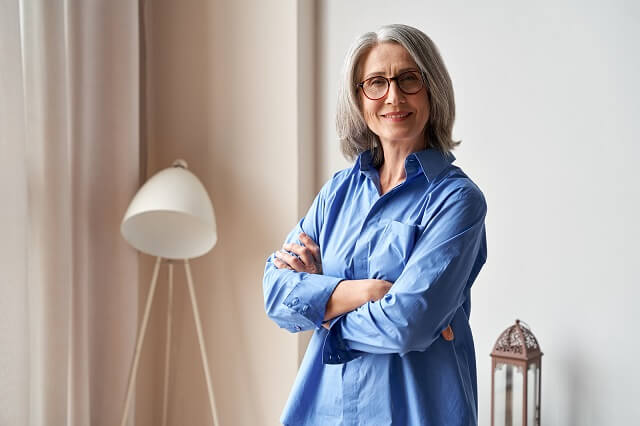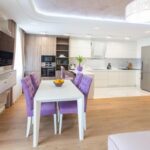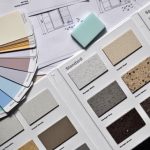What is trending in home decor colors? The world of interior design is constantly evolving, and one of the most impactful aspects of this evolution is the ever-changing landscape of color trends.
From bold and vibrant hues to soothing neutral tones, the choices for decorating your home are vast and diverse. In this article, we will explore the latest trends in home decor colors, covering everything from the influence of Pantone’s Color of the Year to the impact of smart home devices on color choices.
The Influence of Pantone plays a major role in setting the tone for home decor color trends. Each year, Pantone selects a Color of the Year that reflects current cultural and design influences. This color often sets the stage for upcoming trends in interior design, influencing everything from furniture and accessories to wall paint and decor accents. Understanding how Pantone’s selections shape color choices can provide valuable insight into what is currently trending in home decor.
In addition to exploring the impact of Pantone, we will also delve into specific color trends that are making waves in interior design. From jewel tones that make a bold statement to soft pastels that convey a sense of tranquility, there are a wide range of options available for those looking to refresh their living spaces with new hues.
By understanding these trends and learning how to effectively coordinate colors, individuals can create a personalized and on-trend aesthetic for their homes.
The world of home decor colors is dynamic and ever-changing, with unexpected influences shaping future trends. From embracing natural earthy tones to incorporating surprising color palettes, staying informed about these shifts allows homeowners to anticipate the next wave of color trends for their living spaces. Whether it’s through individual preferences or broader societal shifts, keeping up with these developments is key to creating stylish and contemporary homes.
The Influence of Pantone
Pantone, the global authority on color, has become a significant influencer in the world of home decor. Annually, Pantone selects a “Color of the Year,” which serves as a guiding light for designers and homeowners alike when it comes to choosing color schemes for their living spaces. The Color of the Year sets the tone for home decor trends, inspiring new palettes and influencing product development across various industries.
Each year, Pantone’s Color of the Year reflects global cultural trends, expressing the mood and attitude of current times. This influential hue is embraced by fashion designers, graphic designers, and interior decorators who incorporate it into their work. From wall paint to furniture upholstery to small decorative accents, the Color of the Year influences a wide range of products and design choices that eventually find their way into our homes.
In recent years, Pantone’s Color of the Year has led to an increased popularity in specific color families. Designers have noticed a rise in bold and vibrant jewel tones such as emerald green, sapphire blue, amethyst purple, and ruby red appearing in home decor.
On the other end of the spectrum, natural and earthy neutral colors have also gained prominence in interior design. The return of pastels in soft and serene hues has likewise made a comeback, creating a sense of tranquility within living spaces.
- Pastel hues
- Bold jewel tones
- Earthy neutral colors
Bold and Vibrant
The use of bold and vibrant colors in home decor has become increasingly popular in recent years. One particular trend that has emerged is the rise of jewel tones in interior design. Jewel tones are rich, deep colors that resemble precious gemstones such as emerald green, sapphire blue, amethyst purple, and ruby red. These hues add a sense of luxury and opulence to any space, making them a favorite choice for homeowners looking to make a statement with their decor.
The Allure of Jewel Tones
Jewel tones are known for their ability to create a sense of drama and sophistication in a room. Whether used as accent pieces or as the main color scheme, these shades can instantly elevate the ambiance of a space. The deep, saturated nature of jewel tones brings a sense of warmth and coziness, making them particularly popular choices for bedrooms and living areas.
Incorporating Jewel Tones Into Home Decor
There are numerous ways to incorporate jewel tones into home decor. For those who prefer a more subtle approach, using jewel-toned throw pillows, curtains, or artwork can add pops of color without overwhelming the space.
Those seeking a bolder look may opt for painting an accent wall in a rich jewel tone or investing in furniture pieces such as sofas or chairs in these hues. Additionally, accessories like vases, rugs, and lamps in jewel tones can add an elegant touch to any room.
Trending Color Combinations
One trend that is currently popular in interior design is mixing jewel tones with complementary colors to create visually stunning palettes. For example, pairing emerald green with blush pink or amethyst purple with mustard yellow can result in a harmonious combination that adds depth and dimension to a room. Homeowners and interior designers alike are embracing the creativity and versatility that comes with incorporating these captivating colors into their design schemes.
Earthy and Natural
Neutral colors have always been a popular choice in home decor, but they are especially trending right now. From warm beiges and soft grays to creamy whites, neutral colors create a calming and sophisticated atmosphere in any space. The versatility of neutral hues allows them to be easily paired with other colors, making them a great foundation for any interior design scheme.
One of the reasons why neutral colors are currently dominating the home decor scene is their ability to create a sense of balance and tranquility. In today’s fast-paced world, many homeowners are seeking ways to make their living spaces feel like a serene retreat. Neutral colors help achieve this by providing a soothing backdrop that promotes relaxation and well-being.
In addition to their calming effect, neutral colors also contribute to the timeless and classic appeal of a home’s interior. Unlike some trendy color schemes that may quickly become outdated, neutral hues have enduring popularity and can withstand changing design trends.
| Neutral Color | Description |
|---|---|
| Warm Beige | A comforting and inviting color that adds warmth to any room. |
| Soft Gray | An elegant and versatile color that complements a wide range of decor styles. |
| Creamy White | A fresh and airy color that creates a sense of openness and lightness in a space. |
The Return of Pastels
Pastel colors have made a strong comeback in the world of home decor, bringing with them a sense of softness and serenity to interior design. These subdued hues are being embraced for their ability to create calming and peaceful spaces within the home. From pale pinks and blues to muted yellows and greens, pastels are adding a touch of tranquility to living rooms, bedrooms, and even kitchen spaces.
Not only are pastels making a resurgence in traditional interior design, but they are also being incorporated into modern and contemporary styles. Designers and homeowners alike are finding creative ways to blend these soft shades with sleek lines and minimalist aesthetics, resulting in spaces that feel both serene and sophisticated.
Incorporating pastels into home decor is not limited to just paint colors. From furniture pieces to accents such as throw pillows, rugs, and artwork, there are numerous ways to introduce these gentle tones into any room. Additionally, pastels can be paired with bolder colors or used as accents against neutral backdrops for an added layer of visual interest.
Mixing and Matching
Color coordination in home decor is a key element when it comes to creating a cohesive and visually appealing space. With so many color options available, it can be overwhelming to know how to mix and match colors effectively. However, by understanding the basics of color theory and design principles, anyone can master the art of color coordination in their home decor.
The Basics of Color Theory
Understanding the basics of color theory is essential when it comes to mixing and matching colors in home decor. The color wheel is a helpful tool that shows the relationship between different colors.
Complementary colors, which are opposite each other on the color wheel (such as blue and orange or red and green), create a bold and dynamic look when used together. Analogous colors, which are next to each other on the color wheel (such as blue, blue-green, and green), create a more harmonious and serene feel when paired together.
Creating Balance With Neutrals
Incorporating neutral colors into your home decor is a great way to create balance and cohesion when mixing and matching bolder hues. Neutrals such as white, beige, gray, or taupe can help anchor a space and prevent it from feeling too overwhelming. Additionally, using neutrals as a backdrop allows for more flexibility in introducing pops of brighter or more vibrant colors throughout the room.
Utilizing Patterns and Textures
Another way to effectively mix and match colors in home decor is through the use of patterns and textures. Mixing different patterns in coordinating colors can add visual interest without overwhelming the space. Similarly, incorporating different textures – such as smooth surfaces, rough textiles, or glossy finishes – can add depth and dimension to a room’s color scheme. By layering in these elements, you can create an eclectic yet cohesive look that reflects your personal style.
By understanding these principles of color coordination in home decor, you can confidently mix and match various hues to create a space that feels both harmonious and visually interesting. Whether you prefer bold jewel tones or serene pastels, mastering the art of color coordination will allow you to infuse your personality into your home while staying current with what is trending in home decor colors.
The Impact of Technology
In today’s modern age, technology has become an integral part of our everyday lives. This includes the way we design and decorate our homes. With the rise of smart home devices, there has been a noticeable impact on the color choices in interior design. These innovative gadgets have not only changed the way we interact with our living spaces but also how we perceive and select colors for our home decor.
One way in which smart home devices are influencing color choices is through their sleek and modern designs. Many smart devices come in a range of contemporary colors such as brushed metal finishes, matte black, and cool neutrals. As a result, interior designers and homeowners are incorporating these color palettes into their overall decor scheme to create a cohesive and harmonious look.
Furthermore, the integration of smart home technology has also led to a demand for more vibrant and bold color choices in interior design. With futuristic gadgets becoming prominent features in modern homes, there is a desire to complement these pieces with equally striking colors. This has sparked a trend of using jewel tones such as emerald green, sapphire blue, and amethyst purple to add a sense of luxury and sophistication to living spaces.
| Smart Home Devices Impact on Color Choices | Examples |
|---|---|
| Sleek and modern designs influence contemporary color choices | Brushed metal finishes, matte black, cool neutrals |
| Increase demand for vibrant and bold colors | Jewel tones such as emerald green, sapphire blue, amethyst purple |
Embracing the Unexpected
In the ever-changing world of home decor colors, there are plenty of unexpected trends that are making their mark in interior design. While traditional color palettes have always held their place, there has been a noticeable shift towards embracing bolder and more surprising hues in home decor. From unconventional color combinations to unexpected pops of color, homeowners and designers alike are finding creative ways to incorporate these surprising color trends into their spaces.
One of the most surprising color trends shaping the future of home decor is the incorporation of futuristic metallics. As technology continues to play a significant role in our daily lives, it’s no surprise that this influence is also making its way into interior design. Homeowners are now opting for metallic accents and finishes, such as silver, gold, and copper, to add a touch of modernity and sophistication to their spaces.
Another unexpected color trend that is gaining traction in home decor is the use of moody and dramatic hues. While pastel tones have often been associated with softness and tranquility, deep shades like navy blue, emerald green, and charcoal gray are now taking center stage in interior design. These rich colors can add a sense of depth and luxury to a space, creating an ambiance that is both cozy and chic.
In addition to metallics and moody hues, another surprising color trend that is shaping the future of home decor is the resurgence of bold patterns and prints. From vibrant geometric designs to eye-catching florals, homeowners are increasingly drawn to incorporating playful and unexpected patterns into their interiors. This trend not only adds visual interest but also allows for endless opportunities for self-expression and personal style within the home.
Conclusion
As we have seen, the world of home decor colors is constantly evolving, influenced by a variety of factors including the Color of the Year selections by Pantone, the impact of technology, and the desire to embrace unexpected and surprising color trends. Whether it’s the bold and vibrant jewel tones, the earthy and natural neutrals, or the soft and serene pastels, there is something for everyone in the current landscape of interior design.
Looking ahead to the future, it’s exciting to anticipate what will be trending in home decor colors. With new innovations in technology shaping our daily lives, we can expect to see even more integration of smart home devices influencing color choices in interior design. Additionally, as designers continue to push boundaries and explore new ideas, we can certainly anticipate even more unexpected and surprising color trends that will shape the future of home decor.
Ultimately, what is trending in home decor colors is a reflection of our ever-changing tastes, influences from various industries, and a desire for innovation. As we move forward into the next wave of home decor color trends, one thing is certain: there will be an abundance of options to suit every individual’s personal style and preferences.
So whether you’re drawn to bold statement hues or prefer a more subdued palette, there will be no shortage of inspiring choices in the world of interior design.

I’m thrilled to be your companion on this exciting journey through the world of home decor and design. With a passion for turning houses into homes and a keen eye for the finer details, I’m here to help you transform your living spaces into beautiful, functional, and meaningful havens.





